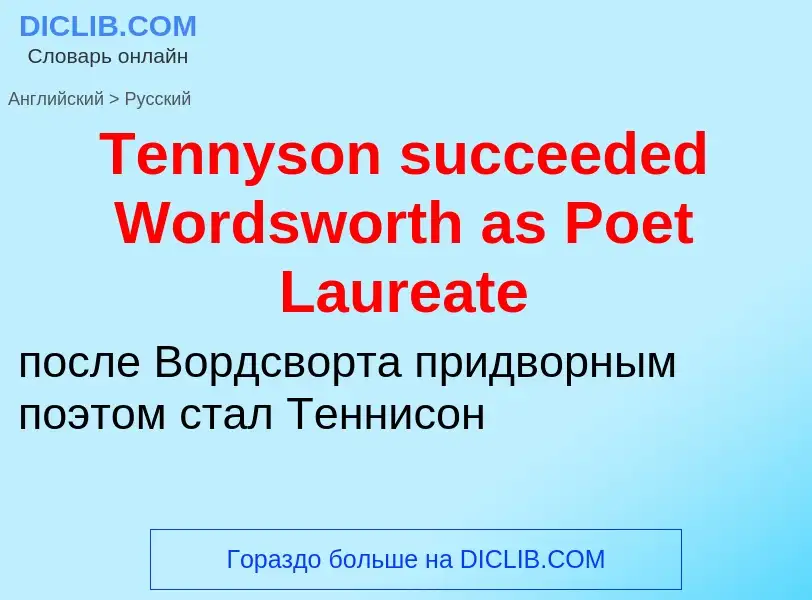ترجمة وتحليل الكلمات عن طريق الذكاء الاصطناعي ChatGPT
في هذه الصفحة يمكنك الحصول على تحليل مفصل لكلمة أو عبارة باستخدام أفضل تقنيات الذكاء الاصطناعي المتوفرة اليوم:
- كيف يتم استخدام الكلمة في اللغة
- تردد الكلمة
- ما إذا كانت الكلمة تستخدم في كثير من الأحيان في اللغة المنطوقة أو المكتوبة
- خيارات الترجمة إلى الروسية أو الإسبانية، على التوالي
- أمثلة على استخدام الكلمة (عدة عبارات مع الترجمة)
- أصل الكلمة
Tennyson succeeded Wordsworth as Poet Laureate - ترجمة إلى الروسية
[,pəuɪt'lɔ:rɪeɪt]
общая лексика
поэт-лауреат, придворный поэт (раньше в его обязанности входило сочинение стихов по случаю коронации [coronation], рождения наследника и т.п.; в последнее время - пожизненное почётное звание, присваиваемое видным поэтам; поэты-лауреаты получают вознаграждение в размере 99 ф.ст. в год; с 1930 по 1967 поэтом-лауреатом был Дж.Мейсфилд [John Masefield]; сейчас эту должность занимает Т.Хьюз [Ted Hughes])
تعريف
ويكيبيديا

A poet laureate (plural: poets laureate) is a poet officially appointed by a government or conferring institution, typically expected to compose poems for special events and occasions. Albertino Mussato of Padua and Francesco Petrarca (Petrarch) of Arezzo were the first to be crowned poets laureate after the classical age, respectively in 1315 and 1342. In Britain, the term dates from the appointment of Bernard André by Henry VII of England. The royal office of Poet Laureate in England dates from the appointment of John Dryden in 1668.
In modern times a poet laureate title may be conferred by an organization such as the Poetry Foundation, which designates a Young People's Poet Laureate, unconnected with the National Youth Poet Laureate and the United States Poet Laureate.
The office is also popular with regional and community groups. Examples include the Pikes Peak Poet Laureate, which is designated by a "Presenting Partners" group from within the community, the Minnesota poet laureate chosen by the League of Minnesota Poets (est. 1934), the Northampton Poet Laureate chosen by the Northampton Arts Council, and the Martha's Vineyard Poet Laureate chosen by ten judges representing the Martha's Vineyard Poetry Society.
Over a dozen national governments continue the poet laureate tradition.








.jpg?width=200)


.jpg?width=200)

.jpg?width=200)



.jpg?width=200)
![Mohammad-Taqi Bahar poet laureate of [[Mozaffar ad-Din Shah Qajar]]. Mohammad-Taqi Bahar poet laureate of [[Mozaffar ad-Din Shah Qajar]].](https://commons.wikimedia.org/wiki/Special:FilePath/Mohammad-Taqi Bahar-Original.jpg?width=200)

.jpg?width=200)

 (cropped) 02.jpg?width=200)
.jpg?width=200)


